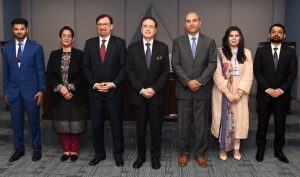India’s Emerging Global Significance: Reshaping
Regional Dynamics and Strategic Equilibrium

The Centre for Aerospace & Security Studies (CASS), Lahore, hosted a thought-provoking seminar titled ‘India’s Emerging Global Significance: Reshaping Regional Dynamics and Strategic Equilibrium’ on 23 October 2023. The event delved into the evolving global scenario, marked by a transition from uni-polarity to multi-polarity, with a focus on India’s persistent efforts to establish a dominant global position.
The seminar commenced with the opening remarks of Ms Nidaa Shahid, Senior Researcher at CASS Lahore, setting the stage for in-depth discussions. This was followed by a compelling keynote address from Air Commodore Khalid Banuri (Retd), former DG Arms Control and Disarmament Affairs (ACDA) at the Strategic Plans Division (SPD). He highlighted the intricate dynamics of the global political transformation, emphasising the crucial need for nuanced understanding and strategic adaptability at both the global and regional levels.
Dr Rabia Akhtar, Director of the Centre for Security Strategy and Policy Research (CSSPR) at the University of Lahore, shed light on India’s expanding influence through strategic partnerships and multilateral engagements as well as its regional implications.
Dr. Adil Sultan, Dean of the Faculty of Aerospace Strategic Studies (FASS) at Air University Islamabad, provided valuable insights into Pakistan’s strategic choices. He discussed the challenges and opportunities, offering effective policy responses.
In his closing statement, Air Marshal Asim Suleiman (Retd), President CASS Lahore, emphasised the significant roles played by middle powers such as India, Germany, Japan, Canada, and Turkey in the evolving landscape of global politics. He underscored India’s aspirations to become a regional and global leader, evident in its substantial investments in military capabilities and active engagements with international platforms like Quad and G20. The President highlighted the potential risks associated with India’s global ambitions, including its military modernisation efforts and the BJP’s assertive anti-Pakistan stance, pointing out the possibility of misadventures and even false flag operations. He cautioned Pakistan to maintain vigilance in response to the current leadership in India.
The seminar highlighted following crucial points:
During the seminar, it was emphasised that middle-powers like Pakistan need to adjust to the global shift from unipolarity to multipolarity. Strategic flexibility and proactive policies were identified as essential components in navigating this changing landscape.
The discussions also underscored India’s engagement in hybrid warfare and aggressive nationalism, which deepens the trust deficit between India and Pakistan, increasing the potential for unintended escalation.
The need for Pakistan to comprehensively reassess its national security priorities was stressed by the speakers. The emphasis was on creating a tailored security strategy, leveraging Pakistan’s strengths while effectively addressing vulnerabilities.
All speakers concurred on the significance of active participation in multilateral forums, strengthening global partnerships, and promoting diplomatic initiatives to highlight the consequences of India’s aggressive stance.
The seminar provided a platform for insightful discussions, emphasising the imperative for Pakistan to respond strategically to the evolving global dynamics. The event concluded with a unanimous call for proactive policy decisions in the face of changing global environment, including diplomatic initiatives and adaptability as Pakistan charts its course in the challenging geo-economic and geo-political landscape.
Editor: Raja Kamran